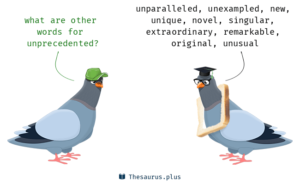Word aficionados and linguistic enthusiasts gather ’round for a tale that will undoubtedly leave you scratching your heads while nodding in weary recognition. It’s time to address the elephant in the room—or should I say, the “unprecedented” in the room? Yes, dear readers, brace yourselves for a rib-tickling journey through the labyrinth of overused vocabulary, with our spotlight on the reigning champion of the linguistic treadmill: “unprecedented.”

In a world where even the most mundane of occurrences is bestowed with the grand title of “unprecedented,” it’s time we step back and marvel at the sheer audacity of this word’s conquest. Have you noticed how the moment you open a newspaper, turn on the TV, or scroll through your social media feed, you’re confronted with a barrage of events described as, you guessed it, unprecedented? It’s as if the lexicon has been infected by a virus that only recognizes this solitary adjective.
Let’s take a trip down memory lane—oh, wait, there’s a detour ahead. Don’t worry, it’s just an unprecedented diversion. But back to the journey. Remember when you were a kid, and your dog chasing its tail was a monumental event? Now, even dogs are chasing their tails in unprecedented ways. It’s like they’re auditioning for some canine version of Cirque du Soleil, breaking records with spins that would make your head spin.
But what truly makes this the age of the “unprecedented” is how the word has seamlessly infiltrated every crevice of our lives. Your morning coffee has an unprecedented level of caffeine. Your daily commute is an unprecedented test of your patience. Your lunchtime sandwich is an unprecedented culinary masterpiece. In fact, if you’re not experiencing something unprecedented on an hourly basis, you might as well be living in a parallel universe.
The overuse of “unprecedented” has become so ubiquitous that it’s a wonder we haven’t had a global shortage of the word. It’s time to bring back balance to our linguistic ecosystem. Picture this: a world where things are simply “ordinary,” “run-of-the-mill,” or even “just another Tuesday.” It’s a world where words like “typical,” “expected,” and “predictable” regain their lost glory.
Furthermore, the misuse of this word has led to some truly questionable situations. Imagine a group of time travelers visiting us from a future where actual unprecedented events occur regularly—alien invasions, unicorn parades, politicians who keep their promises. They’d be baffled by our misuse of “unprecedented,” chuckling at our astonishment over things that are simply routine for them. “Oh, you guys think a solar eclipse is unprecedented? Bless your hearts!”
Of course, it’s not just the “unprecedented” label that’s been thrown around like confetti at a wordy party. We’ve seen its cousins—its linguistic kinfolk, if you will—join the fray. “Historic,” “game-changing,” “earth-shattering”—these words have been lining up at the proverbial thesaurus soup kitchen, waiting their turn to bask in the spotlight. But let’s not forget that “unprecedented” is the head honcho here, the alpha and omega of our lexicon’s current obsessions.
In our quest to outdo each other in shock and awe, we’ve forgotten the rich tapestry of language at our disposal. We’ve neglected the subtle nuances of communication that words like “unique,” “singular,” and “exceptional” can provide. It’s time we give these unsung heroes a chance to shine. Instead of a string of adjectives that end with “ed,” let’s embrace the beauty of a varied vocabulary that paints a more vivid picture of our experiences.
In conclusion, dear readers, let’s embark on a journey to reclaim the richness of our language. Let’s reserve the term “unprecedented” for those moments that genuinely defy expectations, that are so shockingly amazing that even the time travelers from the future would raise an eyebrow. It’s time to retire the “unprecedented” cliché and welcome back its neglected linguistic companions. Until then, let’s make a pact to raise our eyebrows with genuine surprise, not just because someone’s dog managed to turn around three times instead of two.
